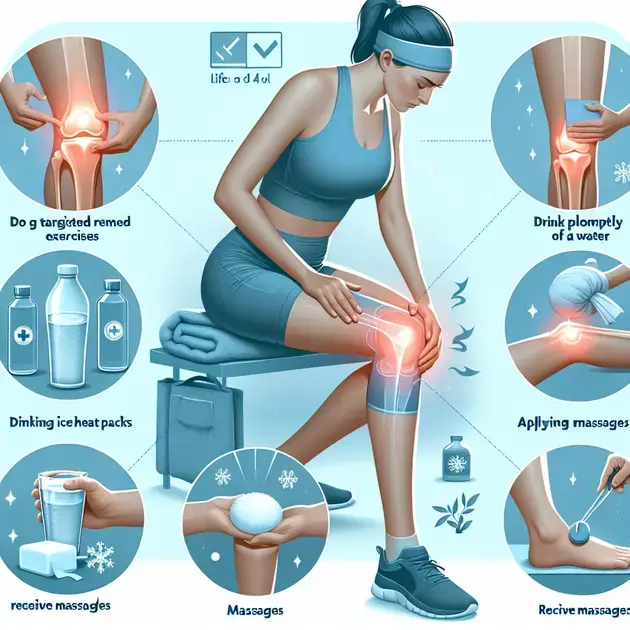If you are experiencing discomfort or pain behind the knee, you are not alone. Dealing with soreness behind the knee can be a common issue that many people face, whether it’s due to overuse, injury, or underlying medical conditions.
Understanding the causes of this type of soreness, along with effective strategies for managing and preventing it, is crucial for maintaining your knee health and overall well-being. In this blog post, we will explore the various reasons why you may be experiencing soreness behind the knee and provide helpful tips on how to deal with it effectively.

Effective Strategies for Managing Soreness
Dealing with soreness can be a challenge, but there are effective strategies you can use to manage it. One great method is to incorporate regular stretching into your routine. Websites like Bodybuilding.com offer a wide range of stretching exercises to help alleviate muscle soreness. Additionally, using foam rollers can also provide relief. Apps like “MyFitnessPal” have tutorials on foam rolling techniques.
Another strategy is to make sure you stay hydrated. Drinking plenty of water is essential for muscle recovery and can help reduce soreness. Apps such as “Water Drink Reminder” can help track your daily water intake and send you reminders to stay hydrated.
Applying ice or heat to the affected area can also be beneficial for managing soreness. Websites like WebMD provide guidelines on when to use ice or heat for various types of soreness. You can also use apps like “Ice & Heat Therapy” for customized recommendations based on your specific needs.
Additionally, getting regular massages can help alleviate muscle soreness. Websites like Massage Envy offer information on the benefits of massage therapy for sore muscles. You can also use apps like “Soothe: In-Home Massage” to book a professional massage therapist to help manage your soreness.
Finally, make sure to listen to your body. Rest is crucial for muscle recovery, so make sure to give yourself adequate time to rest and recover. Apps like “Calm” can help you relax and unwind, promoting better sleep and faster recovery from soreness.
Common Causes of Knee Discomfort
Knee discomfort can be caused by a variety of factors, and understanding the common causes can help you prevent and manage it. One common cause is overuse or repetitive strain on the knee joint. Websites like Arthritis Foundation offer information on how to prevent overuse injuries and protect your knees.
Another common cause of knee discomfort is improper footwear. Wearing shoes that do not provide adequate support or cushioning can put stress on the knees. Apps like “Nike Run Club” can analyze your running gait and recommend the right type of shoes to prevent knee discomfort.
Being overweight or obese can also contribute to knee discomfort. Websites like Mayo Clinic provide resources on how weight loss can help reduce knee pain. You can use apps like “MyFitnessPal” to track your calories and monitor your weight loss progress.
Poor posture and improper body mechanics can also lead to knee discomfort. Websites like Spine-Health offer tips on maintaining good posture to prevent knee pain. Apps like “PostureScreen Mobile” can analyze your posture and provide corrective exercises to improve body mechanics.
Lastly, previous injuries or underlying medical conditions can be a cause of knee discomfort. Consulting with a healthcare professional is essential for proper diagnosis and treatment. Websites like WebMD offer information on various knee conditions, and apps like “Zocdoc” can help you find a suitable healthcare provider for your specific knee issues.
Tips for Preventing Knee Soreness
Prevention is key when it comes to knee soreness, and implementing certain tips can help keep your knees healthy. One important tip is to warm up before any physical activity. Websites like Healthline provide warm-up exercises to prepare your knees for exercise. You can also use apps like “FitOn” for guided warm-up routines.
Engaging in regular strength training exercises can help build the muscles around the knees, providing better support and stability. Websites like ACE Fitness offer knee-strengthening exercises to prevent soreness. Apps like “Fitbod” can create personalized strength training workouts tailored to target knee support muscles.
Maintaining a healthy diet rich in anti-inflammatory foods can also help prevent knee soreness. Websites like Academy of Nutrition and Dietetics provide information on foods that can reduce inflammation and support joint health. Apps like “MyPlate” can help you track your nutrition and ensure you’re consuming a balanced diet.
Using proper form and technique during physical activities is crucial for preventing knee soreness. Websites like Runner’s World offer tips on running techniques to reduce stress on the knees. You can also use apps like “Strava” to track your running form and receive feedback for improvement.
Lastly, wearing supportive gear, such as knee braces or compression sleeves, can provide additional support to prevent knee soreness during exercise. Websites like Bauerfeind offer information on the benefits of wearing knee braces. Apps like “Shock Doctor” can recommend the right type of gear based on your activity level and knee health.

Effective Ways to Alleviate Knee Pain
Are you tired of dealing with persistent knee pain and looking for effective ways to alleviate it? There are several strategies you can implement to help reduce discomfort and improve your quality of life. One of the first steps in managing knee pain is to understand the root causes behind it. By addressing the underlying issues, you can develop a tailored approach to pain relief that works for you.
To alleviate knee pain effectively, it’s essential to consider both short-term and long-term solutions. One approach is to incorporate gentle exercises and stretches into your daily routine to help improve flexibility and strengthen the muscles supporting your knees. Additionally, utilizing hot and cold therapy can provide immediate relief and reduce inflammation in the affected area.
Another effective way to alleviate knee pain is to maintain a healthy weight and adopt proper posture and body mechanics. Excess weight can put additional strain on your knees, exacerbating pain and discomfort. By practicing good posture and body mechanics, you can reduce the stress on your knees and promote proper alignment, ultimately easing pain and promoting overall joint health.
Furthermore, incorporating supplements such as glucosamine and chondroitin into your daily regimen can support joint health and reduce inflammation in the knee. These natural supplements have been shown to help alleviate pain and improve mobility in individuals suffering from knee osteoarthritis. By combining these strategies, you can effectively manage and alleviate knee pain, allowing you to lead a more active and pain-free lifestyle.
Understanding the Root of Knee Aches
When it comes to addressing knee aches, understanding the root causes is crucial for effective pain management. Knee pain can stem from various factors, including overuse, injury, arthritis, or structural abnormalities. By identifying the specific cause of your knee aches, you can tailor your treatment plan to target the underlying issue and alleviate discomfort.
To diagnose the root of your knee aches, consulting with a healthcare professional is recommended. A thorough physical examination and possibly imaging studies can help pinpoint the source of your pain. Once the cause is identified, you can work with your healthcare provider to develop a personalized treatment plan that addresses your unique needs and promotes healing.
In some cases, knee aches may be related to conditions such as osteoarthritis or tendonitis, which require specific interventions to manage effectively. Physical therapy, corticosteroid injections, or in severe cases, surgery, may be necessary to alleviate pain and improve function. By targeting the root cause of your knee aches, you can effectively reduce discomfort and enhance your quality of life.
Additionally, incorporating lifestyle modifications such as maintaining a healthy weight, staying active, and avoiding activities that exacerbate knee pain can help prevent future aches and promote joint health. By understanding the root of your knee aches and taking proactive steps to address them, you can experience long-term relief and optimal joint function.
Simple Exercises to Strengthen Knee Muscles
Strengthening the muscles surrounding your knees is essential for promoting joint stability, reducing pain, and preventing future injuries. Simple exercises that target the quadriceps, hamstrings, and calves can help improve the strength and flexibility of your knee joints, ultimately enhancing their function and reducing discomfort.
One effective exercise to strengthen knee muscles is the leg extension, where you sit on a chair with your legs bent at a 90-degree angle and extend one leg at a time, engaging your quadriceps. This exercise helps build strength in the front of your thighs, supporting your knee joint and improving stability. Additionally, squats and lunges are beneficial exercises that target multiple muscle groups, including the quadriceps, hamstrings, and glutes, promoting overall lower body strength.
Incorporating resistance training with bands or weights can further enhance the strength of your knee muscles. Exercises such as leg presses, calf raises, and hamstring curls can help target specific muscle groups and improve overall joint function. By gradually increasing the intensity and frequency of these exercises, you can build muscle strength and endurance, reducing the risk of knee pain and injury.
It is essential to perform these exercises with proper form and technique to avoid strain or injury. Starting with low-impact exercises and gradually progressing to more challenging movements can help prevent overloading your knee joints and promote safe and effective muscle strengthening. By incorporating these simple exercises into your regular workout routine, you can strengthen your knee muscles, improve joint stability, and alleviate pain and discomfort.
Conclusion
In conclusion, managing knee pain effectively involves a multifaceted approach that addresses both short-term relief and long-term solutions. By understanding the root causes of knee pain, individuals can tailor their treatment plans to target specific issues and alleviate discomfort. Incorporating gentle exercises, hot and cold therapy, and maintaining a healthy weight are key strategies to reduce pain and promote joint health.
Furthermore, supplements like glucosamine and chondroitin can support joint health and reduce inflammation, particularly beneficial for individuals with knee osteoarthritis. Understanding the underlying causes of knee aches, whether from overuse, injury, or conditions like arthritis, is crucial for developing personalized treatment plans that enhance quality of life.
Strengthening knee muscles through targeted exercises like leg extensions, squats, and resistance training is essential for improving joint stability and preventing future injuries. By incorporating these exercises with proper form and technique, individuals can build muscle strength, reduce pain, and enhance overall joint function, ultimately leading to a more active and pain-free lifestyle.
.